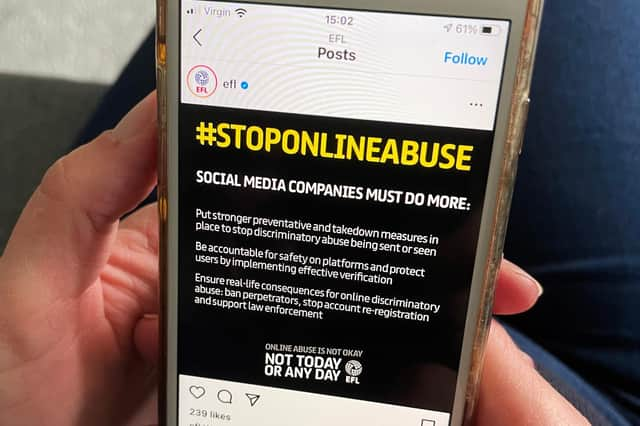A backlash is growing against sexist abuse on social media that gives me hope – Laura Waddell


Although a tiny fraction of what politicians are sent, being a writer online means I sometimes receive abuse. (And as a publisher, a minority of submitters turn nasty when rejected.)
Last week at the UN Generation Equality Forum, Facebook, Twitter and TikTok were among platforms pledging to make changes to keep women safe online. Efforts to this point have been underwhelming on all fronts.
Advertisement
Hide AdAdvertisement
Hide AdHearing nothing back about the majority of posts I report, I try to ignore the noise, making liberal use of block tools. But sometimes the line of intimidation or personal harassment is crossed.
Online abuse must not be underestimated. UN Women describes violence against women during Covid-19 as “the Shadow Pandemic”. In a recent report they associate online forms of abuse against women and girls with psychological, social, and reproductive health impacts.
These include “higher levels of anxiety, stress disorders, depression, trauma, panic attacks, loss of self-esteem and a sense of powerlessness in their ability to respond to the abuse”.
The World Wide Web Foundation also believes there is “a pandemic of online gender-based violence emerging during Covid-19, and it must be addressed now. The increased domestic violence against women witnessed during the crisis is spilling into the online space, turning the lifeline of the internet into a hostile space”.
What the most serious incidents I’ve experienced have in common is misogyny. Every time I’ve received online abuse I can’t easily ignore, implicating my physical safety, it has been tinged with misogynist language. Like domestic abusers, online abusers evoke fear and intimidation.
That’s bad enough. But what can be even more demoralising for the victim is seeing others excuse aggression towards women. No matter how blatantly intimidating the missives, on every occasion I’ve been seriously abused online, representatives of the old boys’ network have appeared to congregate around the offender.
Because Scottish Twitter is a small world, some of these hype men are even in public life themselves. Online abuse is sometimes cited as a reason women don’t enter politics; but it can be equally as crushing to witness how a society you’re part of protects, coddles, and even encourages abusers at your expense.
But I’ve been on Twitter for around a decade. I’ve gained insight into this phenomenon, and a hell of a lot of resilience. I see a shift in onlooker attitudes. Compared to a similar incident around five years ago, before #TimesUp and #MeToo brought nuances of intimidation into public consciousness, this time I felt supported by a stronger backlash, with more people stepping up to say what was happening was unacceptable.
Advertisement
Hide AdAdvertisement
Hide AdAbusers need to exert self control and take responsibility for their own actions, and those with the backbone to stand up to peers exhibiting violent behaviour towards women are doing right by everyone.
Institutional change is essential. But this is the thing that gives me most hope: societal change, however glacial, as a result of a few more people each time saying enough is enough.
